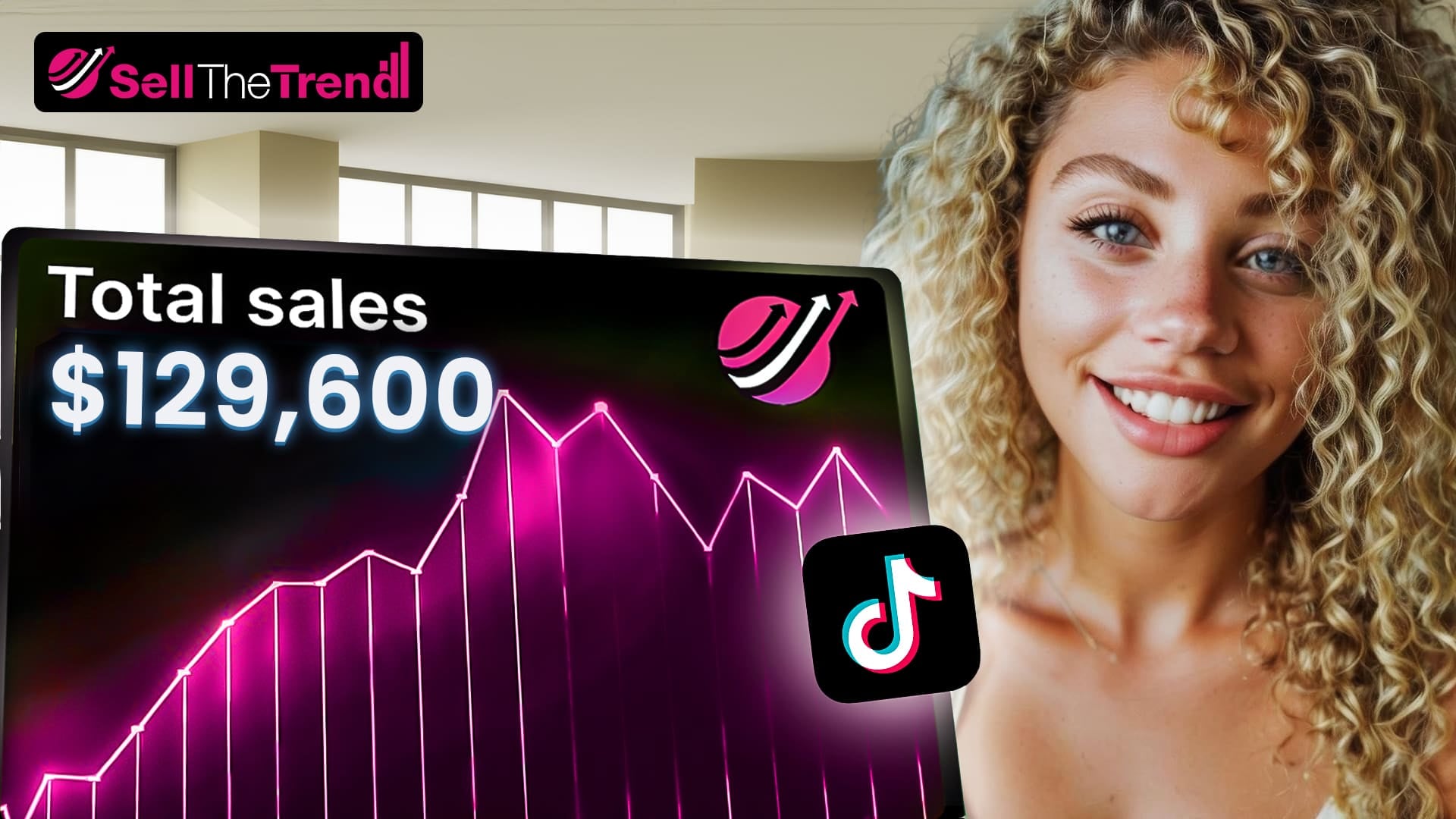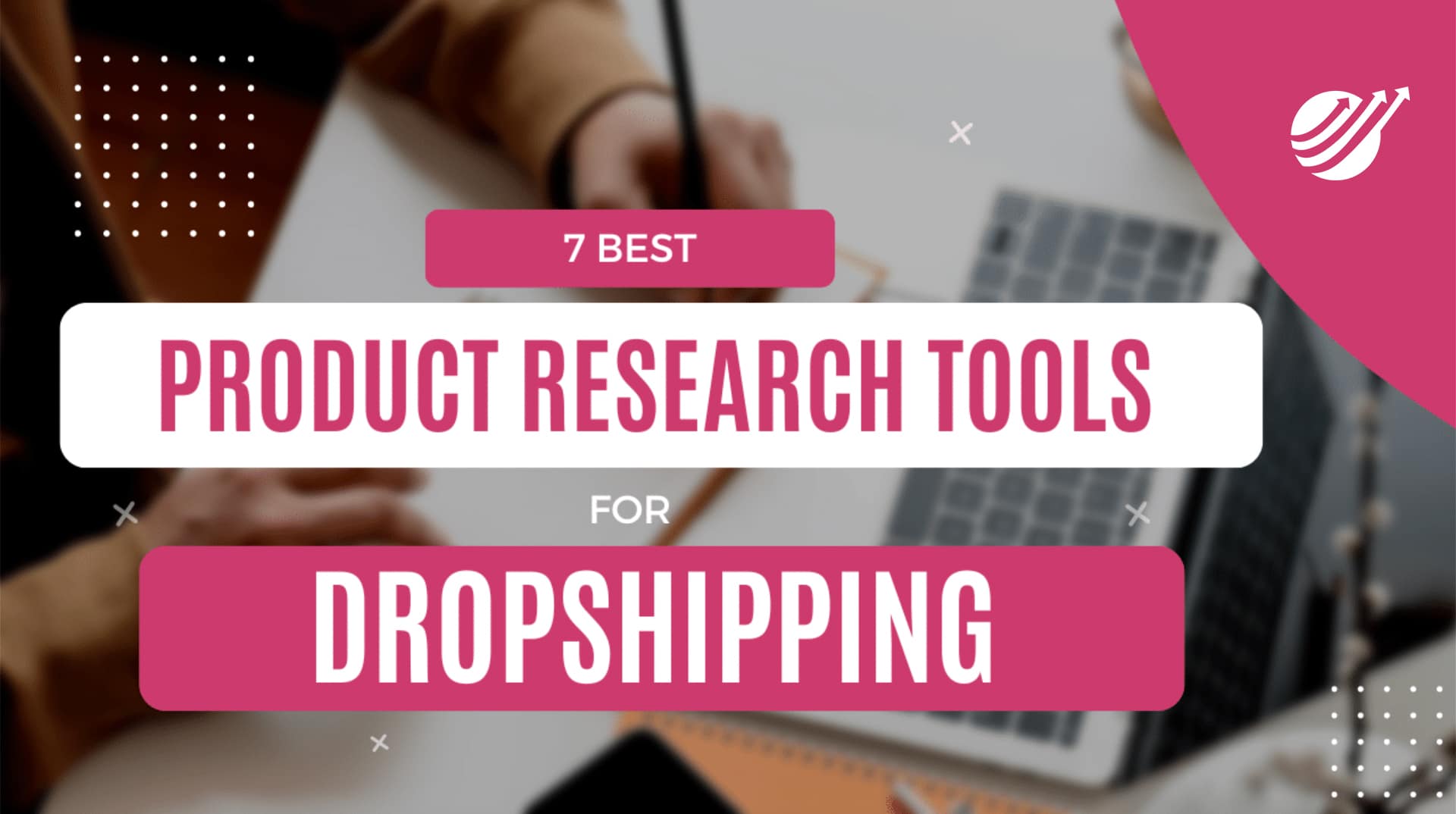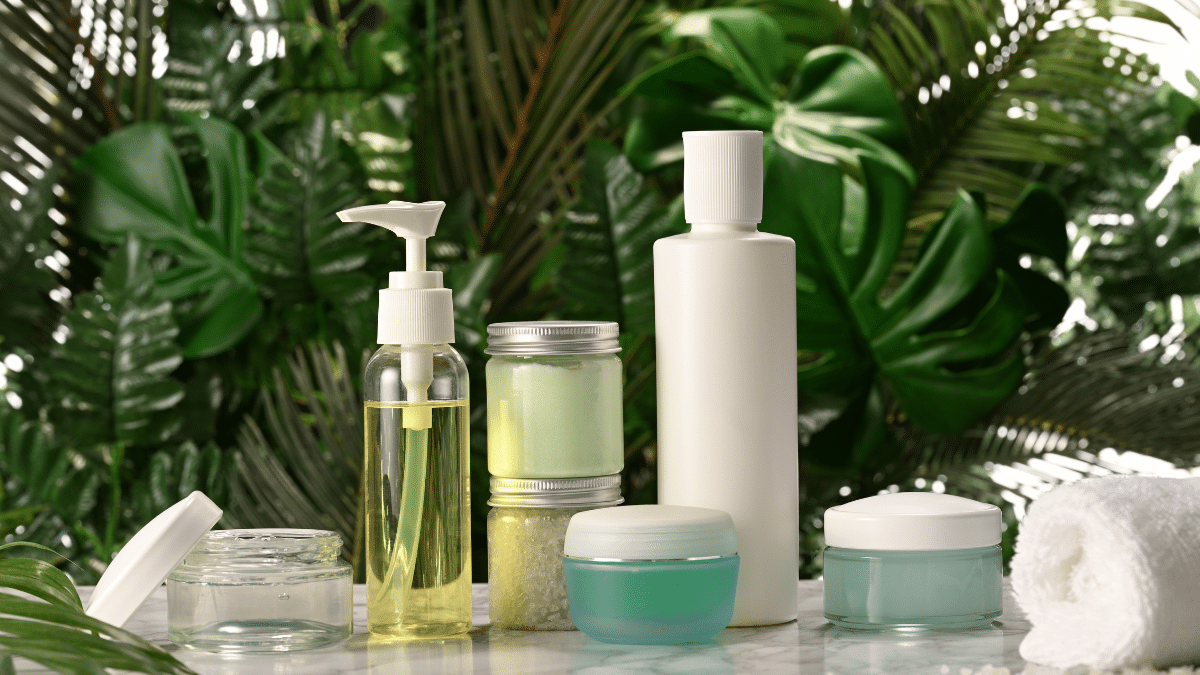How To Dropship Private Label Skincare Products In 2025
Contents
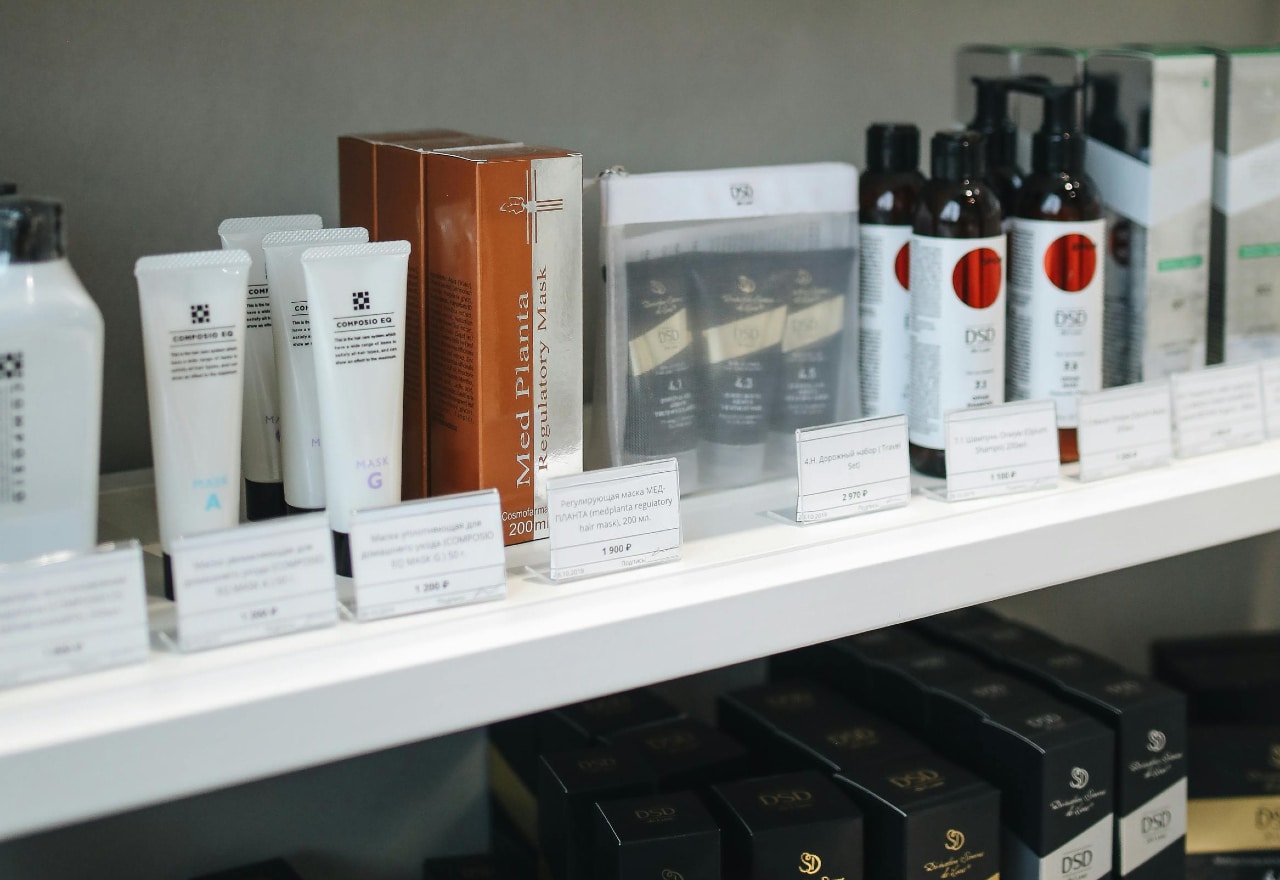
Dropshipping private label skincare products means selling branded skincare without storing or making anything yourself. You pick products from a supplier, add your logo, and sell them online. When someone orders, the supplier ships it for you.
It’s fast to set up, low-cost, and works with almost any budget. In 2025, more beauty brands are using this model to test products, build an audience, and grow without risk. This guide shows exactly how to start.
Key Takeaways
- Private label dropshipping is a low-cost way to launch your own brand in the beauty space.
- You don’t need to hold inventory or create your own formulas to show real benefits to customers.
- Sell The Trend helps you find products, suppliers, and design your product label with ease.
- Custom branding turns generic products into high-margin bestsellers that customers trust.
- Fast setup makes it easy to test, launch, and scale without major risk.
What Are Private Label Skincare Products?
Private label skincare products are pre-made formulas you sell under your own brand name. A manufacturer creates the product—you just add your logo, packaging, and brand identity.
You don’t invent the ingredients or make the product yourself. You choose from items like cleansers, toners, serums, or creams that are already tested, often formulated with natural ingredients, and ready to sell as high-quality products.
This lets you launch a skincare line quickly, with low cost and low risk. Many suppliers also offer custom packaging, labels, and dropshipping options, and allow for a low minimum order quantity, so you never have to handle inventory.
How Sell The Trend makes private label dropshipping simple.
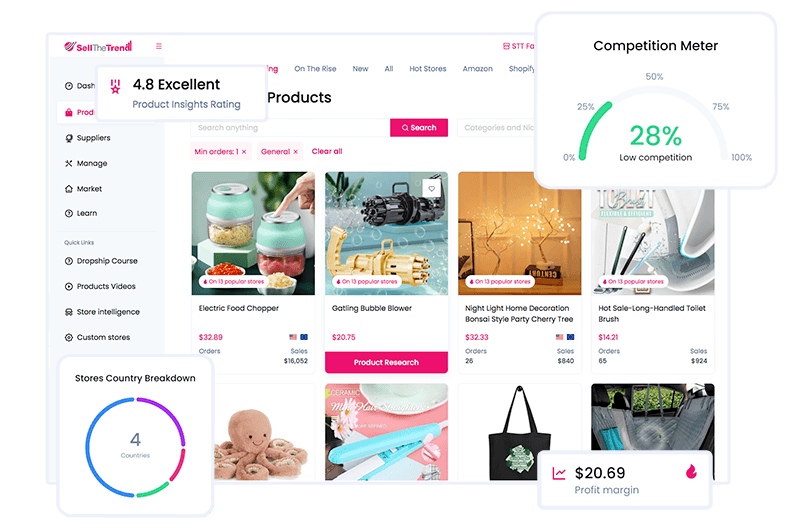
It puts everything you need in one place—product research, suppliers, store building, shipping, and marketing. You don’t have to switch between tools. Everything runs from one easy dashboard.
Instead of guessing what to sell, you can use the NEXUS Product Research Tool. It shows you skincare products that are already trending, with real sales data. You’ll know what’s selling before you even add it to your store.
Use the NEXUS tool to:
- Find skincare products based on niche, price, region, or sales.
- Pick winning items that match your brand and target audience.
Finding a supplier is just as easy. Sell The Trend gives you access to trusted sellers who offer private label, fast shipping, and custom packaging.
- Check supplier profiles to see if they support branding and dropshipping.
- Filter for U.S. suppliers if you want faster delivery times.
You don’t need tech skills to launch your store. Use Sell The Trend’s Smart Store builder or connect your Shopify or WooCommerce store.
- Choose a store design, upload your logo, and add your products in minutes.
Once your store is live, orders go straight to the supplier. They pack and ship the product for you. Tracking is automatic.
- Turn on auto-fulfillment so everything is handled behind the scenes.
You can also use the AI Video Creator to make short product videos—perfect for TikTok or Instagram ads.
- Turn product images into eye-catching video ads in just a few clicks.
You can track everything—orders, sales, suppliers, and product performance—from one dashboard. It’s simple, fast, and made for beginners.
Sell The Trend saves time, cuts startup costs, and makes it easy to launch your skincare brand.
How To Dropship Private Label Skincare Products
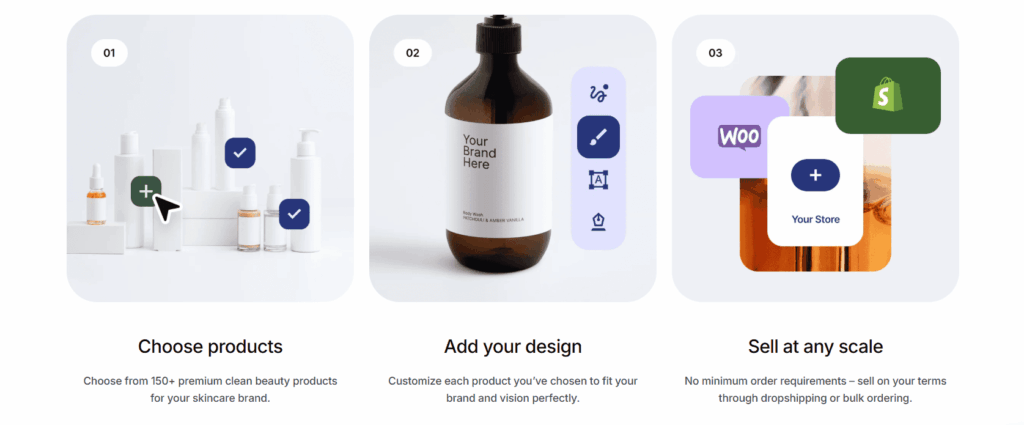
Source: Selfnamed
1. Choose Your Niche
Your niche is the foundation of your skincare business. It determines who you sell to, what products you offer, and how you position your brand. Instead of trying to sell to everyone, focus on a specific group—like people with sensitive skin, acne-prone teens, or buyers looking for organic ingredients.
A clear niche helps you create stronger marketing, choose better products, and build a loyal audience. It also makes your unique brand feel more focused and trustworthy.
Here’s how to find a niche that’s profitable and aligned with your goals:
- Look at Google Trends and TikTok to find consumer demand and viral product types.
- Choose a niche that aligns with your brand story, pricing goals, and long-term vision.
Picking the right niche makes every step after this easier—from branding to product selection to marketing.
2. Find a Private Label Supplier
Once you know your niche, it’s time to find a reliable private label skincare supplier. This company will manufacture the product, apply your branding, and handle fulfillment.
The supplier should offer quality formulations, allow full customization, and support low minimum orders—especially if you’re just starting. Look for fast, reliable shipping (U.S./EU if possible), and always request samples to check product texture, scent, and packaging.
Sell The Trend makes this step faster by connecting you to pre-vetted suppliers who already support private labeling and dropshipping.
To make the supplier search faster and easier, follow these steps:
- Order samples and test both the product quality and customer service.
- Ask about turnaround times, label printing, and dropshipping compatibility.
A good supplier partnership is key—your own line depends on it.
3. Design Your Brand and Packaging
Your brand is what turns a generic cream into a high-end skincare brand. You’ll need a logo, brand name, color palette, and packaging design that reflect your niche and speaks to your target customer.
For example, minimalist packaging may be best suited for a med spa look, while earthy tones could be more suitable for organic ingredients or eco-conscious buyers.
Most suppliers offer templates or guides for creating compliant labels. You can design your own packaging using Canva. For a unique brand mark, try the best AI logo generator and quickly create a professional-looking logo without hiring a designer or hiring freelancer if you want something more premium. Clear branding improves trust, pricing power, and perceived quality—even when using stock formulations.
To create packaging and branding that customers trust and remember:
- Ask your supplier for packaging dimensions and label specs before designing.
- Utilize Canva, Adobe, or a freelancer to establish a consistent and professional branding.
- Upload branding assets (logo, colors, product names) through the supplier’s portal.
This is the moment where your new brand starts to feel real—and different from every other seller in the market.
4. Build Your Online Store
With your products and branding ready, it’s time to build your online store. You can use Shopify, WooCommerce, or Sell The Trend’s Smart Store Builder to launch quickly. Your website should reflect your brand personality and make it easy for visitors to browse, learn, and purchase.
Import your private label products into the store using Sell The Trend’s 1-click import tool. Update product titles, write persuasive descriptions, and make sure your product photos look clean and professional. Don’t forget important pages like shipping info, return policy, and customer FAQs.
As you build your store, focus on these essentials:
- Use Sell The Trend to import your products and set pricing with built-in margin calculators.
- Add product reviews, trust badges, and FAQs to increase conversions.
- Make sure your store is mobile-friendly and loads fast across all devices.
Your store is more than a place to sell—it’s where your brand lives and grows. It should feel like a real one-stop shop for your target buyer.
5. Market Your Brand and Start Selling
Once your store is live, it’s time to drive traffic and make sales. Start by running simple paid ads on platforms like Instagram, Facebook, and TikTok. These channels work well for beauty and label skincare because they are highly visual.
You can also partner with micro-influencers who align with your niche and ask them to share product content with their audience.
Sell The Trend includes an AI-powered Video Creator that helps you turn product images into short-form ad videos—perfect for TikTok and Reels. You can use this to promote new items, bundle offers, or your full collection. Over time, test different ad creatives, messaging, and influencer partnerships to see what brings the best results.
To attract attention and generate your first sales quickly:
- Create ad videos using Sell The Trend’s built-in video tools.
- Use influencer outreach to build UGC and add social proof to your brand.
- Offer bundle deals or launch promos to increase average order value.
This step turns your store into a real skincare business—one built to scale, sell, and grow with time.
Private Label Skincare Products: FAQs
1. Is Private Label Skin Care Profitable?
Yes, private label skin care is highly profitable—especially in today’s growing beauty industry. You don’t need to create your own formulas or carry stock, which keeps startup costs low. With the right marketing, branding, and supplier, a private label skincare business can yield strong profit margins.
Because you’re offering a unique brand, you can charge more—especially when you focus on premium ingredients, organic ingredients, or niche markets like med spa, body care, or hair care. Many entrepreneurs have built full-time incomes and even changed their lives by launching their own line with private labeling.
2. What Is A Private Label Skincare Company?
A private label skincare company makes skincare products for others to rebrand and sell as their own line. These companies handle formulation, manufacturing, packaging, and often even shipping. As a seller, you choose from their product collection, add your branding, and sell it under your unique brand.
These suppliers act as a one-stop shop for launching a skincare brand, offering everything from cosmetics to body care and hair care. The best companies offer customizable options, premium ingredients, and low minimum orders—making it super easy to start your skincare business even without experience.
3. What Are Some Examples Of Private Label Products?
Private label products cover a wide range across the beauty and wellness space. In label skincare, common examples include moisturizers, serums, cleansers, toners, and masks. You can also find cosmetics like lip balms, foundations, and primers.
Beyond facial care, many brands private label body care items such as scrubs and lotions, as well as hair care products like shampoos and oils. Some private label skin care companies also serve med spa businesses that want to offer their clients exclusive products. These items are ready to go—you simply add your branding and make them part of your new brand’s product line.
4. Is It Legal To Private Label Products
Yes, it’s completely legal to sell private label skincare and cosmetics, as long as you follow local and international regulations. The manufacturer is responsible for making sure the formulas are safe and compliant.
As the brand owner, you need to label everything accurately and not make false claims. If you’re using organic ingredients or saying your products are suitable for a med spa, your skincare brand must meet those standards. Most private label skin care suppliers provide guidance on labeling and compliance, so it’s super easy to stay legal and launch your skincare business with confidence.
Conclusion
Building a private label skincare brand through dropshipping is one of the easiest ways to enter the beauty industry today. You don’t need to create your own products, store inventory, or hire a big team. With the right niche, reliable suppliers, and smart tools like Sell The Trend, you can launch your store, customize your products, and start selling fast.
It’s a model that works for beginners and experienced sellers alike. Whether you want to build a side hustle or grow a full skincare business, everything you need is available—and easier to access than ever. Take the first step, test your ideas, and turn your brand into something real.
Maria is a marketing specialist with hands-on experience in digital growth strategies and eCommerce.
As part of the Sell The Trend team, she has developed deep expertise in dropshipping through close work with product research, trend analysis, and go-to-market strategies used by successful online sellers.
Her content focuses on practical marketing insights, audience behavior, and data-driven decision-making to help merchants launch and scale with confidence.





